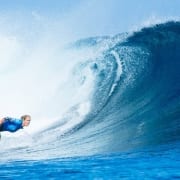“No slave can serve two masters: for a slave will either hate the one and love the other, or be devoted to the one and despise the other. You cannot serve God and wealth.”
— Luke [16:13]
WHOM DO WE SERVE?
John Tyson, CEO of Tyson Foods, has hired more than one hundred chaplains for his workforce. The chaplains deal with family issues, drug and alcohol addiction, and faith issues. The company employees regularly serve meals to those affected by disaster, under a program called “Meals That Matter.” The company has won the International Spirit at Work Award. Not all the employees are Christian, but all are accepted.
“What convinced the board to promote John was his deep faith.”
When John was younger, he dealt with his own demons. He suffered from alcoholism and was far off his path. Through his Christian faith he recovered. However, when his father was set to turn the company over to John, the board of directors had very serious concerns. Through a number of conversations, John was able to convince them of his worthiness. What convinced the board to promote John was his deep faith. He was made CEO and in 2000 implemented the chaplain program at Tyson Foods.
“Jesus points out the pitfalls of being self-interested in the workplace.”
Today’s verse is from the parable of the Dishonest Manager. In this parable Jesus points out the pitfalls of being self-interested in the workplace. The pitfalls of not serving God and your company first. It is a parable not about whether being rich is good or bad, but about whom we serve. When we work, do we keep Jesus’s tenet of “Love your God and Love your neighbor” foremost? Or do we dive deeper into our own ambitions? When we work, do we think about benefiting our customers? Do we think about fair play with our employees and other employees? Where are our hearts and whom do we serve is the critical question.
“When we serve God and our neighbor, we begin to do what we ought to do.”
The temptation to serve ourselves and money is persistent. It pervades the workplace in each day, hour, and minute. We are constantly beset with the choice of serving money or something greater. Serving money and ourselves may have significant short-term gains, but will usually end poorly. When we serve God and our neighbor, we begin to do what we ought to do.
Jesus is clear we can’t serve both. The decisions we make are always choices between one or the other. When we decide our path, we decide on wealth or God.
Blessings, until next time,
Bruce L. Hartman
PARTING THOUGHTS
What are examples in our work life of a choice between two different goals?
How do we handle these choices?
Are we willing to forgo short-term gains for the benefit of others?






